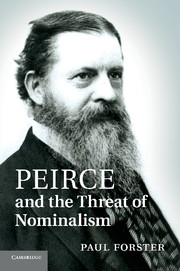Book contents
- Frontmatter
- Contents
- Preface
- List of abbreviations
- 1 Nominalism as demonic doctrine
- 2 Logic, philosophy and the special sciences
- 3 Continuity and the problem of universals
- 4 Continuity and meaning: Peirce's pragmatic maxim
- 5 Logical foundations of Peirce's pragmatic maxim
- 6 Experience and its role in inquiry
- 7 Inquiry as self-corrective
- 8 Theories of truth: Peirce versus the nominalists
- 9 Order out of chaos: Peirce's evolutionary cosmology
- 10 A universe of chance: foundations of Peirce's indeterminism
- 11 From inquiry to ethics: the pursuit of truth as moral ideal
- Bibliography
- Index
11 - From inquiry to ethics: the pursuit of truth as moral ideal
Published online by Cambridge University Press: 28 April 2011
- Frontmatter
- Contents
- Preface
- List of abbreviations
- 1 Nominalism as demonic doctrine
- 2 Logic, philosophy and the special sciences
- 3 Continuity and the problem of universals
- 4 Continuity and meaning: Peirce's pragmatic maxim
- 5 Logical foundations of Peirce's pragmatic maxim
- 6 Experience and its role in inquiry
- 7 Inquiry as self-corrective
- 8 Theories of truth: Peirce versus the nominalists
- 9 Order out of chaos: Peirce's evolutionary cosmology
- 10 A universe of chance: foundations of Peirce's indeterminism
- 11 From inquiry to ethics: the pursuit of truth as moral ideal
- Bibliography
- Index
Summary
In this book I have urged that Peirce's thought is helpfully viewed as a systematic attempt to develop a philosophy at odds with the nominalist orthodoxy of his day. Having started from his mathematical analysis of continuity and laid out the central features of his theories of meaning, experience, inquiry and metaphysics, I turn in this final chapter to his view of the ethical implications of his thought.
In what follows I argue that, for Peirce, inquiry has ethical dimensions that cannot be accommodated on the conception of morality and community that he associates with the nominalist worldview outlined in Chapter 1. As he sees it, the pursuit of truth is an ethical vocation and the community of rational inquirers a model moral community. For him, the fact that inquiry presupposes universal ends contradicts the nominalist's claim that the only goods are goods for this or that individual. The fact that these ends are absolute challenges the nominalist's claim that the only basis for assessing value is subjective preference or desire. Peirce further argues that inquirers are rational only to the extent that they are motivated to seek truth for its own sake, without regard for its contribution to the fulfilment of individual or social ends. In light of this, he thinks the very existence of rational inquiry refutes the nominalist's belief that concern for maximizing subjective utility is the sole motive for action.
- Type
- Chapter
- Information
- Peirce and the Threat of Nominalism , pp. 232 - 246Publisher: Cambridge University PressPrint publication year: 2011



